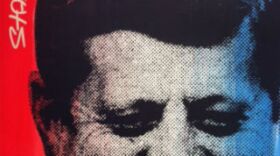A half-century later, has Dallas come to terms with the Kennedy assassination? The answer to that question, explored at a citywide symposium on Saturday, depends on whom you ask.
The day long event, called “Understanding Tragedy,” was one of Dallas’ first major commemorations to mark the 50th anniversary of John F. Kennedy’s assassination. Dallas Mayor Mike Rawlings joined a cast of local and national figures that included longtime public broadcaster Jim Lehrer. On Nov. 22, 1963, Lehrer was a Dallas Times Herald reporter and recalled a comment the night of the assassination.
“There was a guy standing there.” Lehrer said. “It was my recollection he was an FBI agent, I don’t know that for sure. He was just standing there and said ‘Things will never be the same.’ I stopped. I recall thinking ‘Oh my God. Yes.'”
Peabody award-winning essayist Richard Rodriguez, a native of Mexico, was a California schoolboy in 1963. Dallas became known as the city of hate, but he disagreed.
“What I’ve admired about Texas and America, as a Mexican, is your capacity to look away from the past, to look forward” Rodriguez said. “The wind that blows on you 434 is this focus on the future. That’s your gift to America. The immaturity of America is you cannot deal with the past.”
It’s past time to deal with the past, said the Rev. Zan Holmes, a long-time leader of Dallas’ African-American community.
“We have not been good stewards of this tragedy,” Holmes said. “I believe if we’re not good stewards, if we haven’t learned the lessons, life’s teacher will send us back to repeat the course. There’s no way to know we’ve learned the lesson till behavior changes. “
Holmes said we can’t fix the problem unless we face it. But University of Texas at Dallas professor and writer Fred Turner believes the city has faced its shame -- and grown.
“You gave us the integrated circuit,” Turner said. "It gave us UT Southwestern Nobel prize winners, communications technology, its staggering private art collections and now the whole arts district. Something strange has come out of this odd acceptance of that shame.”
The jury seemed out among several hundred in the audience, too. Attorney Frank Hytken argued that the city eventually came to terms with the tragedy.
“It was an earthshaking event,” Hytken said, “and I think the city got too much blame for what happened. It was one mad man, one hate-filled fanatic that bore the responsibility for this. And there was good and bad in the city. The city of Dallas wasn’t to blame for this.”
But fellow audience member Shirley Blue says the city needs to do more.
"I don’t’ think we addressed it,” Blue said. “I think we just said it’s a stigma placed on Dallas, and since it’s on Dallas, we’ll just accept it, it’ll go away. It didn’t go away. For 50 years, we’re still dealing with it.”
Dallas Mayor Rawlings says that’s why the city plans a respectful day of speakers and events to commemorate the anniversary on Nov. 22. He says the city has never thanked Kennedy the way Dallas needs to.







